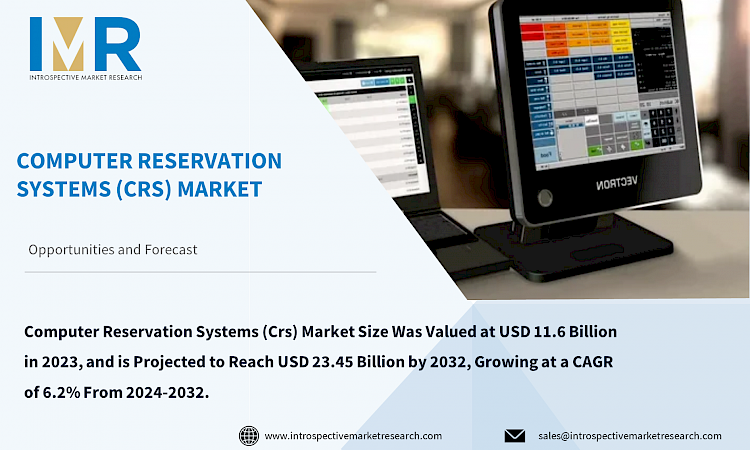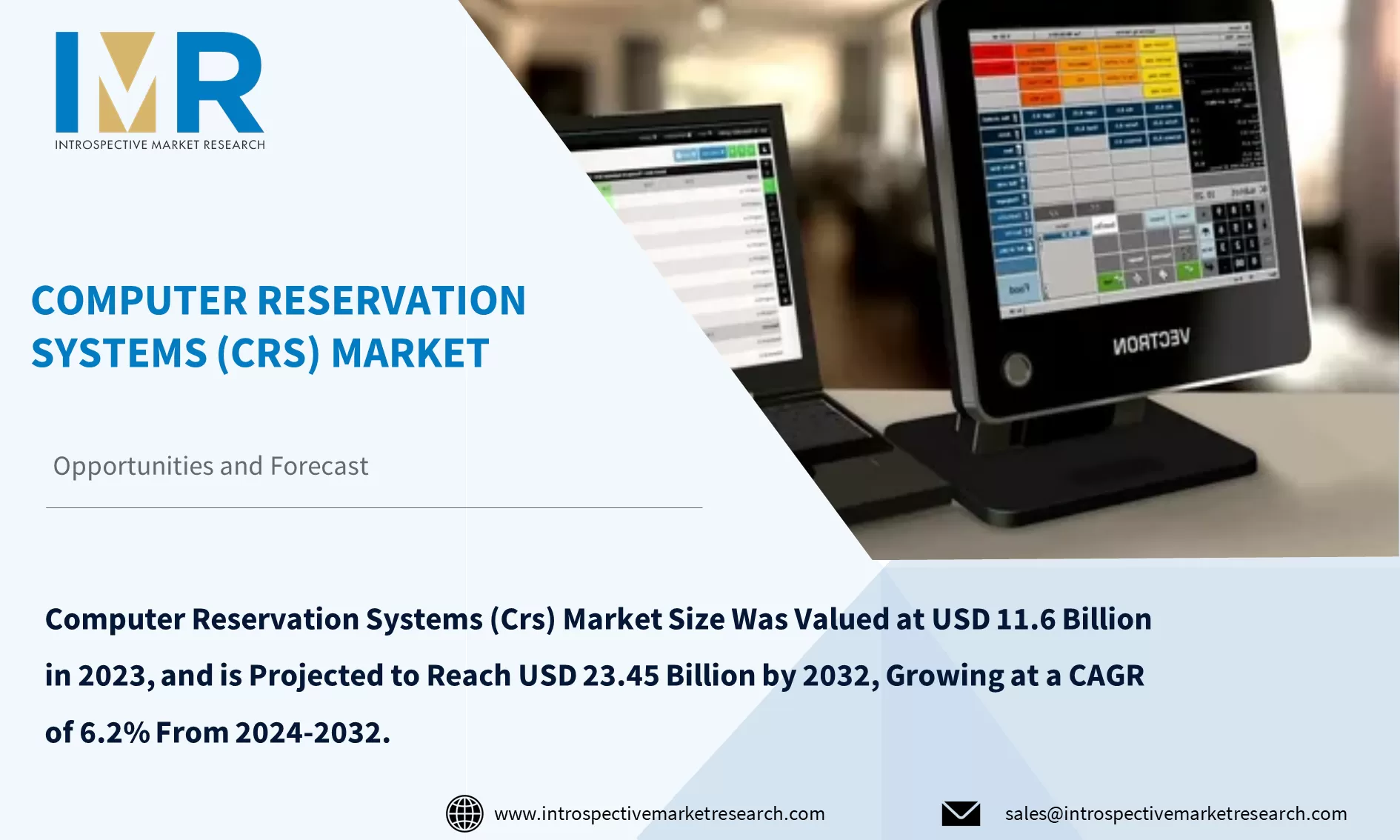
Global Computer Reservation Systems (Crs) Market
According to a new report published by Introspective Market Research, titled, ?Computer Reservation Systems (Crs) Market by Type, Function, and Application: Global Opportunity Analysis and Industry Forecast, 2024?2032,?
Computer Reservation Systems (Crs) Market Size Was Valued at USD 11.6 Billion in 2023, and is Projected to Reach USD 23.45 Billion by 2032, Growing at a CAGR of 6.2% From 2024-2032.
A Computer Reservation System (CRS) is a centralized system used by travel companies and other organizations to electronically manage and distribute reservations for travel-related services such as airline tickets, hotel rooms, car rentals, and other activities. CRS allows users to efficiently search for and book travel products and services by utilizing real-time inventory from multiple suppliers.
CRS has transformed the travel industry by automating and streamlining the reservation process, making it faster and easier for travel agents and consumers to book travel arrangements. With the growth of online travel booking and the introduction of new technologies, CRS platforms have evolved to include advanced features such as real-time inventory management, dynamic pricing, and personalized booking experiences.
The travel industry's increasing embrace of digitalization is a major factor contributing to the CRS market. Demand for CRS systems with user-friendly interfaces and seamless booking experiences has increased as more and more consumers make their travel arrangements through online channels. The reach and accessibility of CRS solutions have been further increased by the development of mobile applications and their integration with social media platforms.
The Computer Reservation Systems (CRS) Market is segmented into Type, Function, Application, and region. By Type, the market is categorized into On-Premise and Cloud-Based. By Function, the market is categorized into Inventory Management, Rate Management, Distribution Management and Reservation Management. By Application, the market is categorized into Hotels and Resorts, Air Travel, Cruise and Car Rental. By region, it is analyzed across North America (U.S.; Canada; Mexico), Eastern Europe (Bulgaria; The Czech Republic; Hungary; Poland; Romania; Rest of Eastern Europe), Western Europe (Germany; UK; France; Netherlands; Italy; Russia; Spain; Rest of Western Europe), Asia-Pacific (China; India; Japan; Southeast Asia, etc.), South America (Brazil; Argentina, etc.), Middle East & Africa (Saudi Arabia; South Africa, etc.).
Online travel bookings are becoming increasingly popular. The demand for CRS systems that can enable smooth and effective booking processes is increasing as more customers prefer the convenience and flexibility of making their travel plans online. These systems are essential for providing travel agents, airlines, hotels, and other service providers with real-time availability, pricing, and information, allowing them to make reservations quickly and precisely. ?
Travelers are increasingly using their smartphones and tablets for booking and planning purposes, so CRS providers are attempting to improve their platforms by adding strong mobile functionality. Creating user-friendly mobile applications, making websites mobile-friendly, and enabling services like real-time notifications, itinerary management, and mobile check-in are all part of this.
Global Computer Reservation Systems (Crs) Market, Segmentation
The Computer Reservation Systems (Crs) market is segmented based on Type, Function, and Application, And Region.
Type:
Cloud-based CRS solutions have several advantages over traditional on-premise systems, including lower costs, greater scalability, and simplified maintenance. Businesses in the hospitality and travel industries are increasingly opting for cloud-based CRS platforms because they provide cost-effective solutions that can easily scale according to their needs, without the overhead costs associated with on-premise hardware and infrastructure. Businesses in a variety of industries are adopting digital transformation initiatives, and the benefits of cloud-based solutions are becoming more widely recognized. Cloud-based CRS platforms enable businesses to access their reservation systems from any location with an internet connection, allowing for remote management and accessibility.
Application:
Independent hotels and the growing popularity of alternative accommodations such as vacation rentals have created a growing demand for CRS solutions customized to the specific needs of these players. Unlike large hotel chains with established distribution networks, independent hotels and resorts frequently lack the funds to invest in sophisticated reservation systems.As a result, they rely on CRS providers to provide cost-effective and customizable solutions for managing bookings, inventory, and guest communications. CRS providers can meet the changing needs of hotels and resorts by providing user-friendly interfaces, seamless integration with distribution channels, and advanced features such as dynamic pricing and yield management.
Region:
The Asia Pacific region, which includes tourism-rich countries such as Thailand, Japan, Australia, and Indonesia, is poised for rapid growth in the Computer Reservation Systems (CRS) market as rising disposable incomes in many of the region's countries drive increased spending on travel and tourism. As more people gain the financial means to travel domestically and internationally, the demand for convenient and efficient reservation systems is expected to increase.
Some of the leading Computer Reservation Systems (Crs) market players are
- Sabre (US)
- SHR Windsurfer (US)
- Galileo GDS (US)
- Worldspan GDS. (US)
- Cendyn (US)
- GuestCentric CRS (US)
- Blue Sky Booking (Canada)
- Amadeus (Spain)
- FlightsLogic (Norway)
- Vertical Booking (Italy)
- Clock Software (UK)
- SiteMinder (Australia), and Other Active Players.
Key Industry Developments
- In July 2023, Hyatt Hotels Corporation signed an agreement with Hyatt Sabre Corporation a leading provider of software and technology to the global travel industry. Beginning in 2024, Sabre's SynXis Central Reservation System will serve as the primary Central Reservation System (CRS) for Hyatt hotels under this agreement.
- In June 2023, SHR's Windsurfer CRS partnered with Adyen to provide modern payment options. The full API integration enables travelers to pay for their hotel reservations securely using a wider range of payment options, including Google Pay and Klarna, a leading buy-now-pay-later provider.
Key Findings of the Study / Key Industry Developments.
- The widespread digitalization of the travel industry is a primary driver of CRS market growth. As travel companies and service providers embrace digital solutions, there is a significant push towards adopting CRS platforms that can streamline operations and enhance user experiences.
- The shift from on-premise to cloud-based CRS systems is notable. Cloud-based CRS solutions offer several advantages, such as cost-effectiveness, scalability, and ease of maintenance. They allow businesses to access reservation systems from any location, facilitating remote management and increasing operational efficiency.





